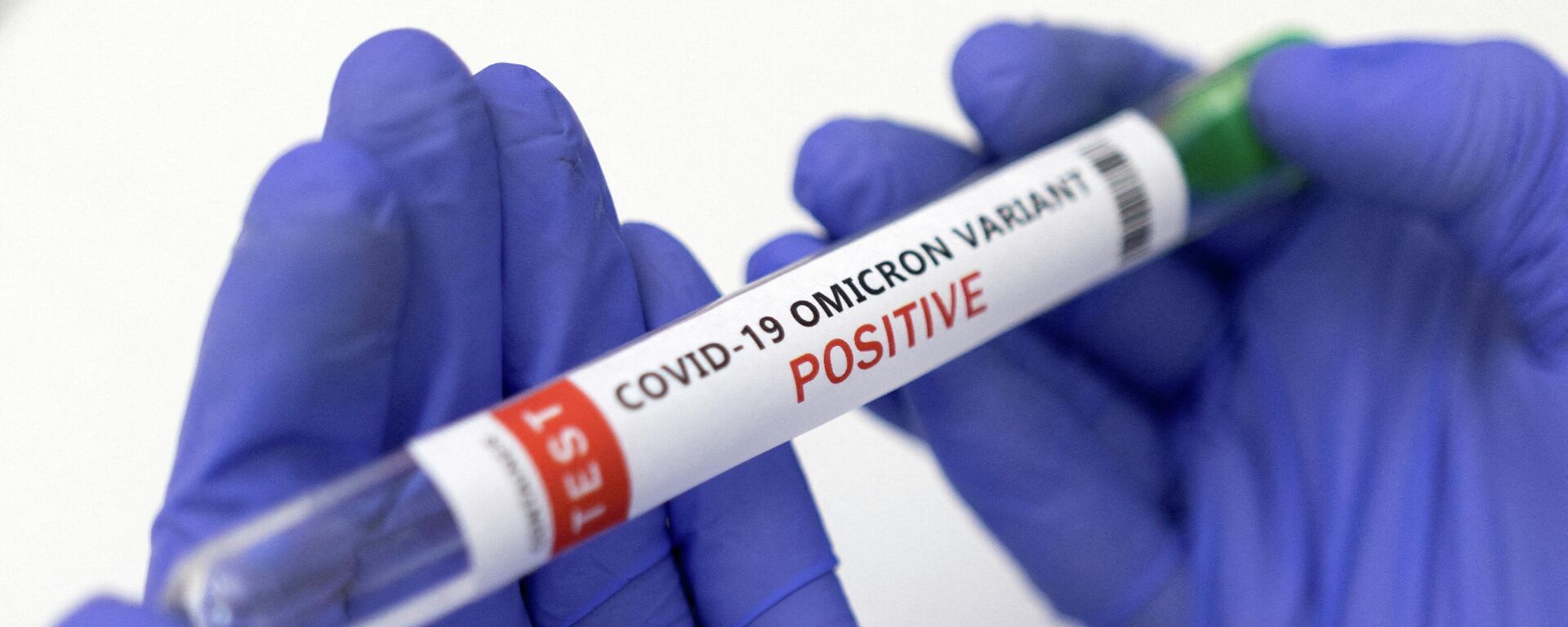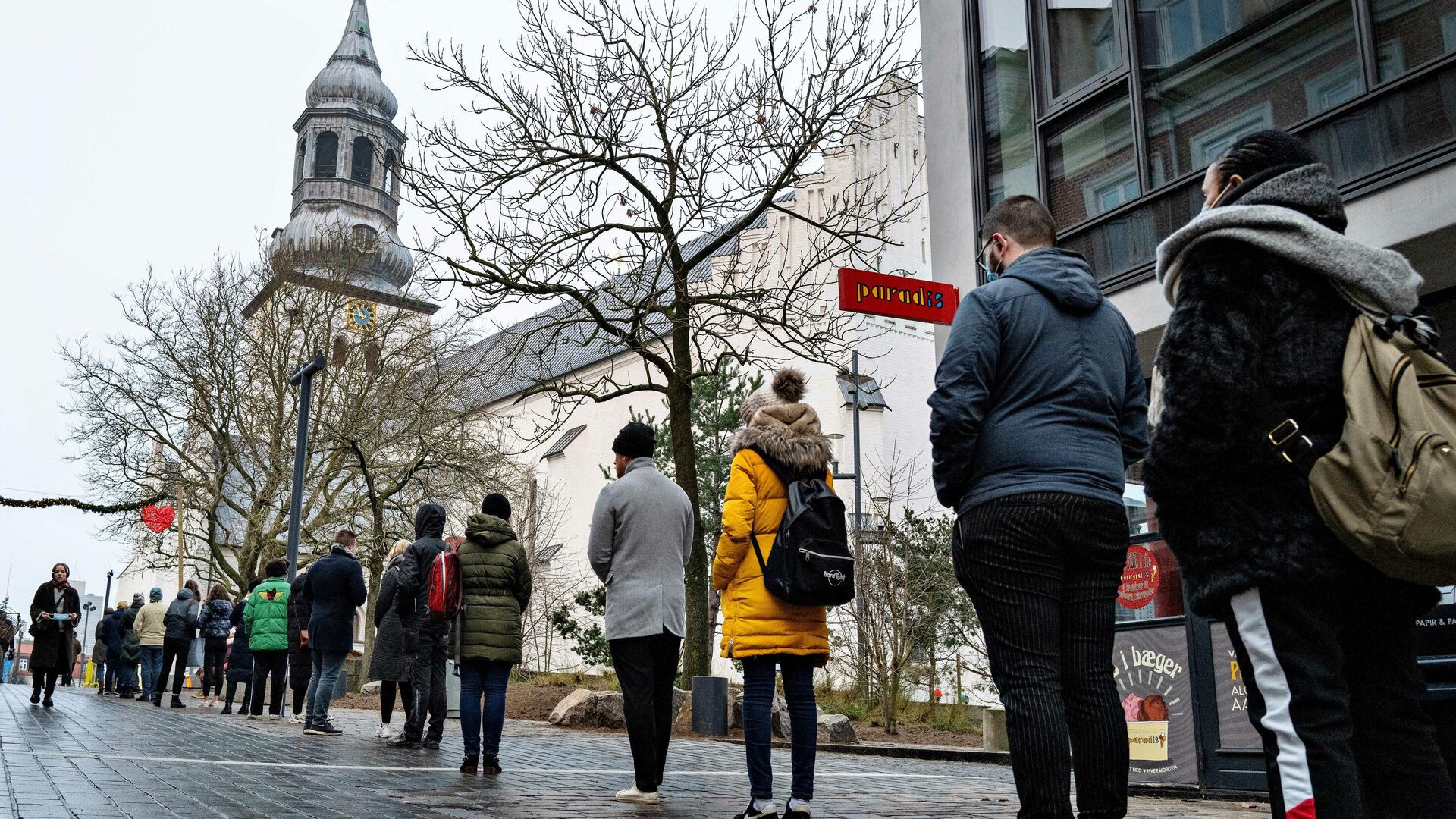https://sputnikglobe.com/20220201/first-eu-country-lifts-covid-related-restrictions-despite-surge-in-cases-1092652851.html
First EU Country Lifts COVID-Related Restrictions Despite Surge in Cases
First EU Country Lifts COVID-Related Restrictions Despite Surge in Cases
Sputnik International
In the autumn of 2021, Denmark made its first attempt at going back to a pre-pandemic lifestyle by ditching all of its COVID-19 restrictions. A spike in cases... 01.02.2022, Sputnik International
2022-02-01T06:27+0000
2022-02-01T06:27+0000
2022-02-01T06:36+0000
europe
omicron covid strain
denmark
restrictions
vaccination
covid-19
https://cdn1.img.sputnikglobe.com/img/07e6/02/01/1092653187_0:0:2945:1657_1920x0_80_0_0_5b9f3c9b518f6f847ac63941c12a06e8.jpg
Denmark becomes the first country in the European Union to scrap all coronavirus restrictions on Tuesday, 1 February. Despite facing about 40,000-50,000 new COVID-19 cases a day, the Scandinavian country has stopped viewing the virus as a socially-critical disease, and is pinning hopes on its high vaccination rate in the fight against the Omicron strain and its now-dominant subvariant, BA.2.Nightclubs will reopen Tuesday as limits on the number of people allowed at indoor gatherings also come to an end. Only some restrictions will remain in effect at the country's borders for unvaccinated travellers arriving from non-Schengen countries.The Danish Health Authority now "recommends" those who test positive for coronavirus to self-isolate for four days. Contact cases, however, no longer require quarantine.The "incredibly good news" about abandoning the restrictions was announced by Danish Prime Minister Mette Frederiksen last week, following recommendations from the Epidemic Commission and with the support of all the nation's main political parties.Prime Minister Frederiksen said she did not expect to have to impose fresh restrictions but remained cautiously optimistic. "We can't provide any guarantees when it comes to biology", she said, announcing the country's return "to life as we knew it before corona".The country's Health Minister Magnus Heunicke explained that "the situation in Denmark is that we have this decoupling between infections and intensive care patients, and it is mainly due to the large attachment among Danes to revaccination. That is the reason why it is safe and the right thing to do now".The Scandinavian country made its first attempt to drop all restrictions in September 2021, but had to reinstate them in November. In December, the kingdom introduced additional restrictions as Omicron cases surged, closing museums, theaters and cinemas, reducing the operating hours of bars, cafes and restaurants until 11:00 p.m. local time [22:00 GMT], and banning the sale of alcohol after 10:00 p.m.Last week, Denmark recorded 51,000 infections, which is its highest weekly toll since the onset of the pandemic. In total, Denmark has recorded 1,667,768 COVID-19 cases since the beginning of the pandemic, with 1,117,205 recoveries and 3,755 related deaths.
https://sputnikglobe.com/20220201/new-more-infectious-substrain-of-omicron-may-prolong-pandemic-danish-study-says-1092652675.html
denmark
Sputnik International
feedback@sputniknews.com
+74956456601
MIA „Rossiya Segodnya“
2022
Sputnik International
feedback@sputniknews.com
+74956456601
MIA „Rossiya Segodnya“
News
en_EN
Sputnik International
feedback@sputniknews.com
+74956456601
MIA „Rossiya Segodnya“
Sputnik International
feedback@sputniknews.com
+74956456601
MIA „Rossiya Segodnya“
europe, denmark, restrictions, vaccination, covid-19
europe, denmark, restrictions, vaccination, covid-19
First EU Country Lifts COVID-Related Restrictions Despite Surge in Cases
06:27 GMT 01.02.2022 (Updated: 06:36 GMT 01.02.2022) In the autumn of 2021, Denmark made its first attempt at going back to a pre-pandemic lifestyle by ditching all of its COVID-19 restrictions. A spike in cases, however, resulted in the reintroduction of the limitations.
Denmark becomes the first country in the European Union to scrap all coronavirus restrictions on Tuesday, 1 February. Despite facing about 40,000-50,000 new COVID-19 cases a day, the Scandinavian country has stopped viewing the virus as a socially-critical disease, and is pinning hopes on its high vaccination rate in the
fight against the Omicron strain and its now-dominant subvariant, BA.2.
Nightclubs will reopen Tuesday as limits on the number of people allowed at indoor gatherings also come to an end. Only some restrictions will remain in effect at the country's borders for unvaccinated travellers arriving from non-Schengen countries.

1 February 2022, 06:22 GMT
The Danish Health Authority now "recommends" those who test positive for coronavirus to self-isolate for four days. Contact cases, however, no longer require quarantine.
The "incredibly good news" about abandoning the restrictions was announced by Danish Prime Minister Mette Frederiksen last week, following recommendations from the Epidemic Commission and with the support of all the nation's main political parties.
"Tonight we can...find the smile again. We have incredibly good news, we can now remove the last coronavirus restrictions in Denmark. Recent weeks have seen very high infection rates, in fact the highest in the entire pandemic. Therefore, it may seem strange and paradoxical that we are now ready to let go of the restrictions", Frederiksen said at a press conference at the end of January, clarifying that the last restrictions will be dropped on 1 February.
Prime Minister Frederiksen said she did not expect to have to impose fresh restrictions but remained cautiously optimistic. "We can't provide any guarantees when it comes to biology", she said, announcing the country's return "to life as we knew it before corona".
The country's Health Minister Magnus Heunicke explained that "the situation in Denmark is that we have this decoupling between infections and intensive care patients, and it is mainly due to the large attachment among Danes to revaccination. That is the reason why it is safe and the right thing to do now".
Over 60 percent of Danes have received a third (booster) dose of the vaccine one month ahead of health authorities' schedule, compared to an EU average of just under 45 percent.
The Scandinavian country made its first attempt to drop all restrictions in September 2021, but had to reinstate them in November. In December, the kingdom introduced additional restrictions as Omicron cases surged, closing museums, theaters and cinemas, reducing the operating hours of bars, cafes and restaurants until 11:00 p.m. local time [22:00 GMT], and banning the sale of alcohol after 10:00 p.m.
Last week, Denmark recorded 51,000 infections, which is its highest weekly toll since the onset of the pandemic. In total, Denmark has recorded 1,667,768 COVID-19 cases since the beginning of the pandemic, with 1,117,205 recoveries and 3,755 related deaths.




